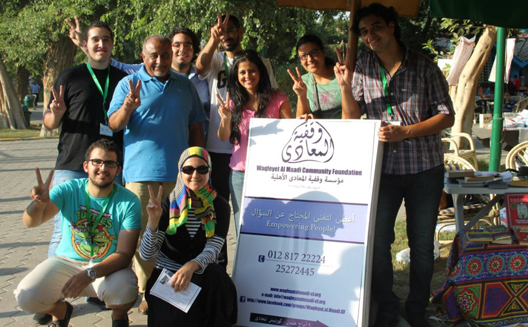Reviving Egyptian Waqf to Catalyze Social Change

 Change starts when citizens start asking questions to
solve local issues, and themselves try to find new alternatives to
traditional work methods.
Change starts when citizens start asking questions to
solve local issues, and themselves try to find new alternatives to
traditional work methods.
The idea of Waqfeyat Al-Maadi
Community Foundation began when Founder Marwa Al-Dali started
reconsidering and studying the methods adopted in development work
and its funding in Egypt, and placing them within the framework of
social entrepreneurship and sustainability.
After noticing that there is a gap between social endowment and
development work priorities, she created the foundation as
an independent non-profit community in 2007, to reinvent
Islamic endowment (or Waqf) in a modern way, using funds derived
from Zakat and tithing to improve
living standards in Cairo's Al-Maadi neighborhood.
The idea behind Waqfeyat is to get citizens directly involved in
improving neighborhoods based on the needs of local residents.
“Waqfeyat looks for sources of strength in our heritage and inside
our community, and that’s why it is capable of achieving a lot. It
focuses on the idea of engaging young people in particular,
prompting them to draw on their history and heritage to build a
stronger future,” says Al-Dali.
Challenges to Development Work

Development work and social endowment face a lot of
challenges in Egypt, namely dependence on external financing, and
the fact that most Egyptians are not involved in civil
society.
On the other hand, local organizations and community foundations
are often viewed as charities that focus on short-term needs. Both
of these models lack a strategic long-term vision that's locally
inclusive and promotes an independent civil society.
“Social endowment should empower and engage others, which makes it
a tool for enhancing and strengthening the community. It should
also be sustainable,” says Al-Dali.
Waqf's Historical Impact
Waqf can be defined as a donated asset - whether in the form of
land, property or money - that is invested in a social project.
One big example is the University of Cairo, which was originally a
community university established from charity endowment money.
Under Princess Fawzia, daughter of Khedive Ismail, it was funded by
the Waqf of certain territories, and has become a leading
institution from which millions of Egyptians have graduated.
After independent endowment funds were legally cancelled in Egypt
in 1952, all endowment funds became subject to the Ministry of
Awqaf, yet Waqfeyat was able to establish itself independently
in 2007 through advocacy and lobbying efforts. Now, the foundation
works to support new legal frameworks for community foundations and
civil society; one recent victory is Article 212 of the new
Egyptian Constitution, which allows the establishment of private
endowment funds.
Spreading the Model
One of Waqfeyat’s first programs was the Khan Centre for Arts,
“Khan Arts”; another is “Fath Bab Al-Rizk” ("opening the door
to livelihood"), which grants rotating loans with no interest from
local Zakat funds to citizens starting their own
businesses.
Waqfeyat also advocates to raise awareness about the impact of
properly implemented endowment and supports similar
social entrepreneurship initiatives, as well as a Youth Engagement
Program.
In 2012, in honor of its efforts in pioneering independent
endowment foundations, uniting communities, and leading in Egypt's
social entrepreneurship, Waqfeyat was given the African
Philanthropy Award.
Now their model is being replicated via other social
initiatives, including Mante2ty. As it is able to further
advocate for a legal framework that enables foundations to
establish Waqfs, the hope is that Egypt can
continue to sustainably rebuild its neighborhoods with local
support.


